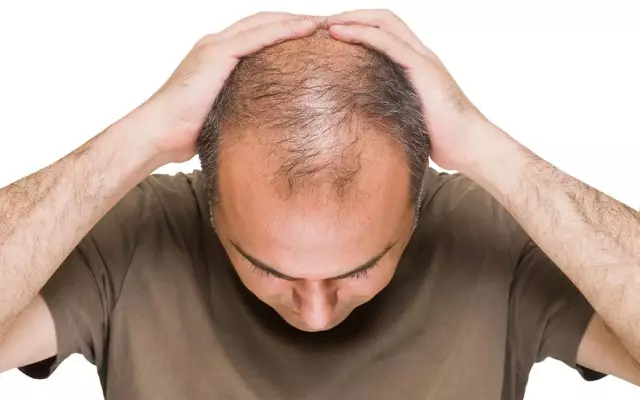- Author Rachel Wainwright wainwright@abchealthonline.com.
- Public 2023-12-15 07:39.
- Last modified 2025-11-02 20:14.
10 myths about male alopecia
The problem of alopecia worries many men. About a third of the stronger sex have hereditary characteristics that cause an increased sensitivity of hair follicles to the level of the main male hormone - testosterone. An increase in the concentration of testosterone in the body provokes the growth of hair on the face and body and a simultaneous thinning of the hair.
The mechanism of alopecia is not fully understood. Perhaps this was the basis for the emergence of myths about alopecia. Our article is devoted to the most common of these misconceptions.

Source: depositphotos.com
Baldness is a problem of mature age
This is not true. In most balding men, hair loss begins between the ages of 20-30. It just goes slowly and becomes noticeable only in adulthood. The earlier alopecia begins to appear, the greater the hair loss.
That is why, having noticed a small area of baldness on the head, it is better to immediately consult a trichologist. In the early stages, alopecia can be treated and most of the hair can be preserved.
Alopecia areata is maternal
The reason for this misconception was the discovery of German scientists: in 2005, they discovered the gene responsible for the tendency to alopecia in the X chromosome, passed on to the son from the mother. But three years later, a similar gene was identified in the hereditary material that the child receives from the paternal line. Thus, the tendency to baldness can be obtained from either parent.
Hair care products enhance hair loss
At various times, shampoos, gels and hair sprays were declared the culprits of baldness. No evidence has been found that such personal care and personal care products contain substances that are harmful to hair follicles. Of course, we are talking about products of well-known brands.
And in general, such statements are simply absurd: manufacturers of hair care products are interested in the number of consumers of their products to grow, and they are doing everything possible to increase the number of people with lush hair. Firms that produce such products usually carefully monitor their composition, especially taking care of their harmlessness.
To maintain hair, you need to cut more often
All men know that frequent shaving makes facial hair thicker and harder. Unfortunately, the scalp lacks this feature. The density of the hair does not depend on the frequency of visits to the hairdresser and it is impossible to stop baldness with a haircut.
Ultraviolet radiation causes alopecia
The dependence of hair loss on ultraviolet radiation has not been proven. The harm that excessive insolation causes to the body is different - people who abuse being on the beach or in a solarium risk getting skin lesions. The likelihood of developing malignant neoplasms also increases. At the same time, the scalp rarely suffers, as it is protected by hair.
Hair follicles can be restored
Unfortunately, this is not true. Modern medicine is not yet able to revive dead follicles. The only way to restore the lost hair is hair follicle transplantation.
From this, however, it does not follow that it is useless to consult a doctor with the problem of alopecia. In the early stages, the development of the disease can be slowed down, for which drugs, physiotherapy procedures (including laser) and some other means are used.
Stress provokes baldness
Stress has a negative effect on the entire body and can provoke pathologies of internal organs. Hair loss is one of the symptoms. But it is impossible to say with confidence that physical and emotional stress causes baldness. It is a complex mechanism influenced by many factors.
The cause of alopecia is fluctuations in testosterone levels
This is not entirely true. Baldness is not caused by changes in the concentration of testosterone in the blood, but by the degree of sensitivity of hair follicles to its decay products. It, in turn, is determined by a genetic predisposition.
The mechanism of the development of baldness is not yet clear to scientists. In particular, it is not known why the process of hair loss begins and why in different people with a tendency to pathology, it starts at different ages. High testosterone levels do induce baldness, but it doesn't seem to be the only cause of alopecia.
Wearing a hat is bad for your hair
The opposite statement is true: wearing a headdress is good for health in general and for the preservation of hair in particular. Under the influence of aggressive environmental factors (direct sunlight, precipitation, sudden changes in temperature), the scalp becomes thinner and thinner. Hair becomes dry and brittle, scalp and hair follicles suffer. A hat or cap is quite capable of protecting your hair from most of the troubles.
Apparently the myth arose from the fact that hair growing on the legs and arms sometimes does fall out when rubbed against tight-fitting clothing. The headgear cannot squeeze the hair so hard to cause it to fall out.
Bad habits cause baldness
Tobacco smoke really worsens the condition of the hair, and nicotine, disrupting capillary blood circulation, reduces nutrition, including the hair follicles. However, no direct link has been found between smoking and alopecia. Theoretically, we can assume the following: nicotine, alcohol and drugs cause intoxication of the body, which, among other things, has a depressing effect on testosterone production. Both overeating and a sedentary lifestyle do not contribute to an increase in the level of male hormones. It turns out that men prone to bad habits should go bald faster than the more prudent representatives of the stronger sex.
Alopecia is a genetic anomaly, but in the early stages, the balding process can be slowed down or stopped altogether. Therefore, having found a problem, you should not despair - you need to contact a trichologist and follow his recommendations.
YouTube video related to the article:

Maria Kulkes Medical journalist About the author
Education: First Moscow State Medical University named after I. M. Sechenov, specialty "General Medicine".
Found a mistake in the text? Select it and press Ctrl + Enter.






